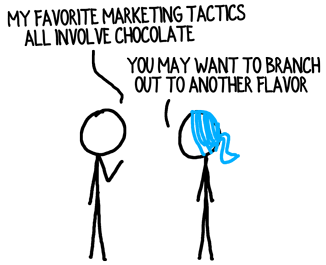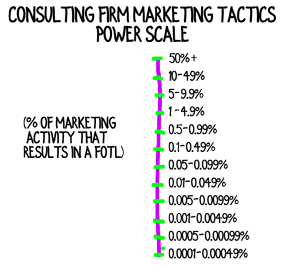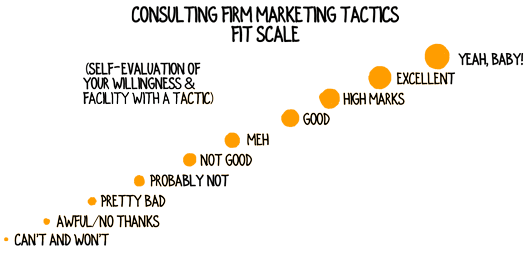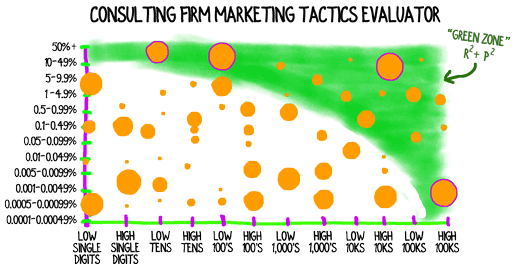Two quick questions for you:
- What are your favorite marketing tactics to promote your consulting firm?
- What marketing tactics should you use to promote your consulting firm?
Your answers to both questions may be the same, because your favorite marketing tactics deliver dual benefits: you’ll employ them (actions beat good intentions every time), and you’ve learned through experience that they bring in consulting clients.
However, you can upgrade your marketing tactics beyond repeating your old favorites. Think of marketing tactics like chocolate truffles: you’ve probably only sampled a small variety of consulting firm marketing tactics, and your experience may be limited.

To select the best marketing tactics for your consulting firm, it’s important to remember:
The success of your marketing efforts is not gauged by the number of projects you sign. It’s judged by the number of legitimate opportunities to win a consulting engagement that your marketing generates.
A legitimate consulting opportunity is a proposal that has at least a 60% chance of closing.
That’s when you have a fish on the line (a.k.a. a FOTL).
The job of your consulting firm’s marketing is to put you in a position to submit legitimate proposals. In other words, to generate FOTLs.
To determine which marketing tactics could drive FOTLs for your consulting firm, evaluate each possible marketing tactic on the three scales below. (There’s a compendium of marketing tactics in this article)
Reach
Reach is the number of relevant people (decision-makers, influencers, influencers of influencers) who will be exposed to your consulting firm by the marketing tactic.
In general, consider a three-year time horizon for Reach. For example, if you post a speech online, how many relevant people will see that speech over three years?
The tactics you employ could reach only a few relevant people or up to tens of thousands (e.g., garnering introductions to other decision-makers inside a current client’s organization vs. PPC advertising).
Since your consulting firm’s target market is unique, how you score each marketing tactic’s Reach will vary a bit from other consulting firms’ scoring. Use the following scale:

Power
Power is a combination of two factors:
The tactic’s ability to start conversations between your consulting firm and relevant people; and,
The likelihood that the conversation will lead to a legitimate consulting proposal with at least a 60% chance of closing.
In-person tactics (e.g., meetings) and long-form tactics (e.g., books) tend to have higher Power than impersonal, short-form tactics (e.g., logo on the rear bumper of a race car).
How you score the Power of each marketing tactic will vary a bit depending on your particular market. If you don’t have history with a tactic, make your best estimate or get input from a consultant who has used that tactic before.
Use the following scale, which reflects the likelihood of starting a conversation and that conversation leading to a legitimate proposal opportunity:

Fit
Fit also reflects two factors:
Your consulting firm’s willingness to regularly, consistently engage in the marketing tactic. If, for instance, you’d rather pluck ticks from a stranger’s dog than write and market a book, I suggest striking books from your list of marketing tactics.
Your consulting firm’s facility with the marketing tactic. If you’re objectively better at tick removal than, say, compellingly delivering a speech, then de-prioritize speaking.
Combine those two Fit factors together in a final, 1-10 scale that is, obviously, completely unique to your consulting firm:

Taken all together, you now can prioritize your marketing efforts.
If you’re a math geek type of person, determine the FOTL-generating effectiveness of each marketing tactic by combining the Reach, Power and Fit scales.
FOTL-Power = R(squared) + P(squared) + F(squared)
The less mathilogical among us can take a simpler approach:
Identify all the tactics in the green zone shown below.

Pick the tactics in the green zone that have the biggest circles.
By the way, if personal outreach isn’t in your green zone for some reason, double check your scoring on Reach and Power, because it’s the most reliable, visibility-building activity for 95% of consulting firms.
What marketing tactic that’s not your favorite, will you try in 2020?
Text and images are © 2024 David A. Fields, all rights reserved.

 David A. Fields Consulting Group
David A. Fields Consulting Group 

The 3-year time frame is legitimate. I actually have used that because my first contact is usually when my clients are in the start up stage. They have been awarded their first federal contact and now need help. Usually, they don’t need my level of assistance with their first contract. My goal is to be top of mind when they actually need my services, which more in line with 3 to 5 years in business with $5M in revenue and now being audited by the federal government. To keep these start ups engaged, I developed an online tutorial, sort of a DIY section of my website. I use MemberSpace to automate subscriptions. I only charge $10 a month but it has become the source for 90% of my new business. I will be launching our accounting app soon and will use the DIY section as a marketing channel for the software as well. I’ve been in business now for 10 years and I still get business from proposals I did 5 years ago with no recent follow up. Just need to stay top of mind.
Excellent example of playing the long game, Mark. Also, thank you for sharing the details of your new-business engine, which highlights 1) making your offering what your clients need (vs. what you want to sell), 2) building Trust over time, and 3) using marketing as “reminder advertising” so that prospects call you when they’re ready to engage.
Outstanding illustration of marketing tactics in action, Mark.
Agree that personal outreach is essential. And it can actually be fun. The less you think of it as dialing for dollars, and the more you think of it as catching up and talking about stuff that you both care about, the easier it seems, and the more effective you will be.
Totally agree with you, Reuben. Too many consultants dread picking up the phone because they associate it with selling. But, as you eloquently suggest, consulting isn’t sold; it’s bought. Personal outreach is about nourishing relationships, not pursuing projects.
I appreciate your comment, Reuben.